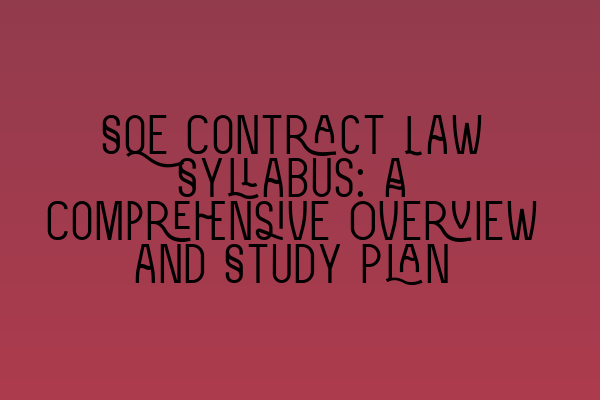Welcome to the SQE Contract Law Syllabus: A Comprehensive Overview and Study Plan. If you are aspiring to become a solicitor and are preparing for the SQE exams, you’ve come to the right place! In this blog post, we will provide you with a detailed understanding of the SQE Contract Law syllabus and offer you a study plan to help you ace the exams.
The SQE Contract Law Syllabus
The Solicitors Qualifying Examination (SQE) is the new centralised assessment for all aspiring solicitors in England and Wales. The SQE Contract Law syllabus covers a wide range of topics to ensure that you are equipped with the necessary knowledge and skills to practice law effectively. Let’s take a closer look at the key areas of the syllabus:
1. Formation of Contracts
In this section, you will learn about the essential elements required for the formation of a valid contract, such as offer and acceptance, consideration, intention to create legal relations, and capacity to contract.
To dive deeper into the topic, read our article on Navigating Legal Challenges and Pitfalls in Your Practice.
2. Terms and Conditions
Here, you will explore the different types of terms that can be included in a contract, including express terms, implied terms, conditions, warranties, and innominate terms. You will also study the rules of interpretation and the concept of fundamental breach.
3. Performance and Discharge
This section focuses on the performance and discharge of contractual obligations. You will learn about the different ways in which a contract can be discharged, such as through performance, agreement, frustration, breach, or by operation of law.
For a comprehensive comparison between barristers and solicitors, check out our article on Barrister vs. Solicitor: A Comprehensive Comparison.
4. Remedies
Here, you will study the various remedies available for breach of contract, including damages, specific performance, injunctions, and restitution. You will also explore the limitations on remedies and the calculation of damages.
5. Privity of Contract
This section deals with the doctrine of privity of contract and its implications. You will learn about third-party rights and the exceptions to the privity rule.
6. Agency
In this part of the syllabus, you will gain an understanding of the law of agency and the relationship between principals, agents, and third parties. You will explore the rights, duties, and liabilities of all parties involved.
To explore different solicitor specializations and find your niche, have a look at our article on Exploring Different Solicitor Specializations: Finding Your Niche.
The Study Plan
Now that you have an overview of the SQE Contract Law syllabus, it’s time to create a study plan to ensure you cover all the necessary topics. Here’s a suggested plan:
1. Familiarize Yourself with the SQE Syllabus
Start by going through the official SQE syllabus to get a clear understanding of the topics you need to cover. This will help you structure your study plan accordingly.
2. Break It Down
Divide the syllabus into manageable sections based on the number of days or weeks you have available for studying. This will help you stay organized and avoid feeling overwhelmed.
3. Allocate Study Time
Determine how much time you can dedicate to studying each day and allocate it to the different sections of the syllabus. Be sure to leave some buffer time for revision closer to the exam date.
4. Use a Variety of Resources
Make use of textbooks, online resources, past papers, and practice questions to enhance your understanding of the topics. This will also familiarize you with the exam format and help you gauge your progress.
If you want to learn more about the rise of virtual law practices, read our article on Embracing the Rise of Virtual Law Practices.
5. Create a Revision Schedule
As the exam date approaches, allocate dedicated time for revision. Review the topics you have already studied and focus on areas where you feel less confident. Practice past papers to get a feel for the exam format and time management.
For a clear understanding of the ethical responsibilities of solicitors, check out our article on Navigating the Maze: Demystifying Ethical Responsibilities of Solicitors.
6. Seek Guidance, if Needed
If you encounter difficulties or have questions while studying, don’t hesitate to seek guidance from your tutors, study groups, or online forums. It’s important to clarify any doubts to ensure a solid understanding of the topics.
By following this study plan and dedicating consistent effort and time, you are well on your way to mastering the SQE Contract Law syllabus and achieving success in the exams. Good luck on your journey to becoming a qualified solicitor!
